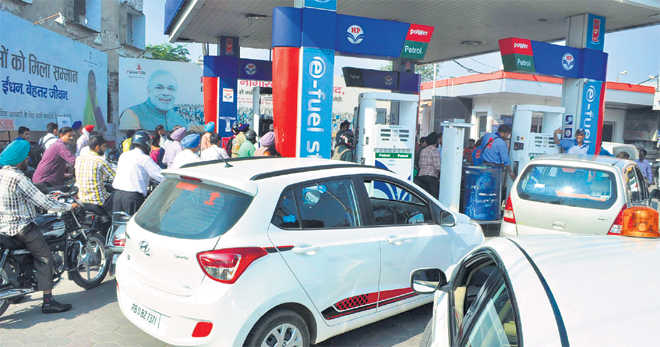
Setback: The trend in global oil prices could hurt development efforts.
Sushma Ramachandran
The news that India and China may join forces to counter the rising prices of crude oil in world markets is a welcome development. It means that a more hard-headed approach is being taken to foreign policy with economic interests being made paramount. The fact is that India and China are the two biggest consumers of crude oil, after the United States, and their collaboration will make them formidable players in the market place. The comments by Petroleum Minister Dharmendra Pradhan and the representative of China’s National Energy Administration at the recently concluded International Energy Forum make it clear that the two countries are planning to become partners to try and influence the price of oil. The Indian Oil Corporation and the China Nation Petroleum Corporation have reportedly been directed to jointly negotiate for better prices from global oil producers.
The backdrop of this move is the hardening trend in world oil prices that could be a setback to the developmental efforts of both countries. Currently international markets have recorded a spike in prices following geopolitical tensions after US strikes on Syria. The Brent benchmark crude has crossed $72 per barrel, though the Indian basket of crudes remains lower for the time being at $63 per barrel. This is still significantly higher than the average price of $46.75 per barrel for the Indian basket in 2016-17. The outlook for world oil prices over the next six months remains uncertain since tensions may heighten further in the Middle East. The ongoing trade war between the US and China is also likely to have an impact though right now it is not clear whether it would lead to a hike or dip in prices. At the same time, the oil cartel, the Organisation of Petroleum Exporting Countries (OPEC), along with Russia, is continuing to maintain cuts in production quotas of member-countries to ensure that prices are sustained at current levels.
In any case, with this partnership India and China are likely to take up critical issues that are of immediate concern to both of them. A major one is that of the so-called Asian premium on crude oil sales to countries in this region. The premium is the higher price paid by Asian countries for oil purchases as compared to those in Europe and North America. The apparent reason given is that the prices offered to Western countries are based on other production sources and benchmark crudes like Brent and West Texas Intermediate. Supplies to Asia, on the other hand, are linked to prices of Dubai or Oman crude markets which reflect higher rates. India has in recent times consistently sought an end to Asian premium and is rightly seeking a discount instead as purchases by countries in this region are higher than in the rest of the world. China and India have become the biggest importers of oil in the world. The US continues to be the highest user at 19.53 million barrels per day (mpd), which is 20 per cent of global consumption. China follows with 12.02 mpd and 13 per cent share while India is third with 4.14 mpd and 4 per cent share.
The two countries which are now consuming 17 per cent of global crude need to utilise their combined heft to ensure that oil producers provide some kind of discount, or Asian dividend, as its being described, to their biggest clients. This kind of cooperation between the two countries makes their relationship infinitely more complex and nuanced than is the general perception. There is a broad public impression that the India-China ties are of a largely hostile nature linked to incidents like the border spat at Doklam. On the economic front, however, the situation is vastly different as India and China often take similar positions in multilateral agencies in the international arena.
For instance, there have been tie-ups with China at the WTO and on climate change issues as well. Recently India has offered to supply soyabean to China. The offer was made in the wake of China raising tariffs on soyabean imports from the US in retaliation to tariff hikes made by that country. The China-US trade war has thus had some unintended positive outcomes, at least in the short run.
If the collaboration in buying oil becomes a reality, it could come as a major relief to both these big oil importing countries. In India’s case, the import bill shot up last year owing to the rise in world oil prices. From an average of about $45 per barrel, prices rose to about $60 per barrel. As a result, oil imports are expected to cost $87.7 billion in 2017-18 as compared to $71 billion in 2016-17. This has led to domestic prices of petrol, diesel, aviation turbine fuel and industrial oil products rising sharply thus affecting both industrial and retail consumers. A further rise in prices could have a significant inflationary impact on the economy. Thus if the two countries jointly negotiate better prices, it could help in reducing the growing import bill. The Asian premium, as it is called, can sometimes be as high as $5-6 per barrel which is a huge add-on to the prices offered by the same oil producers to Western countries.
If the joint negotiation is successful, it could become the precursor to more such collaborations in other areas. The fact is that emerging economies have many common issues on the international arena but are not able to coordinate their strategies effectively. As a result, developed countries are able to steal a march on them as has been done in the area of multilateral trade negotiations. Rich countries are still able to justify huge agricultural subsidies and yet crib about support being given to poor farmers in countries like India. Hence this is a good beginning in energy cooperation. One can only hope it will end up extending to other areas of the economy.



























